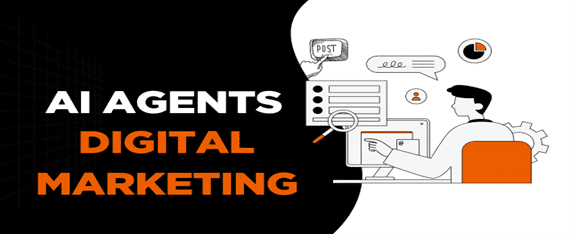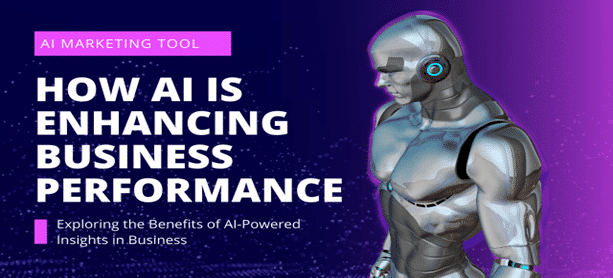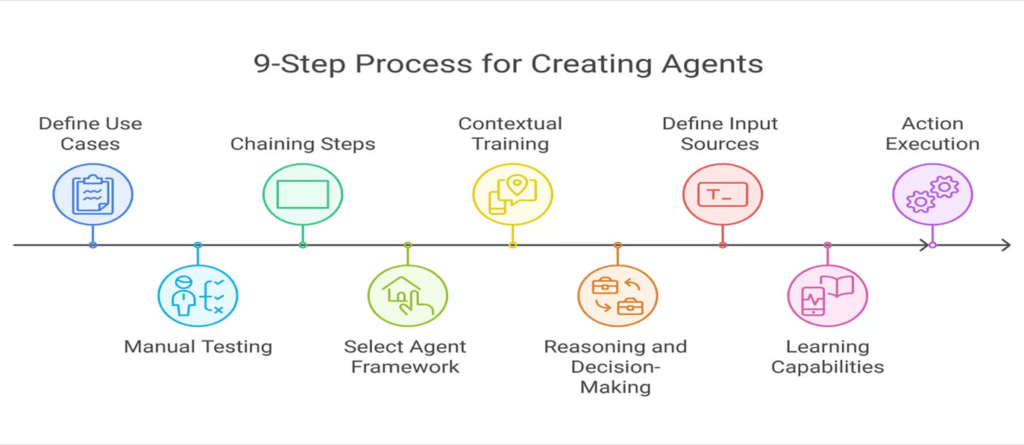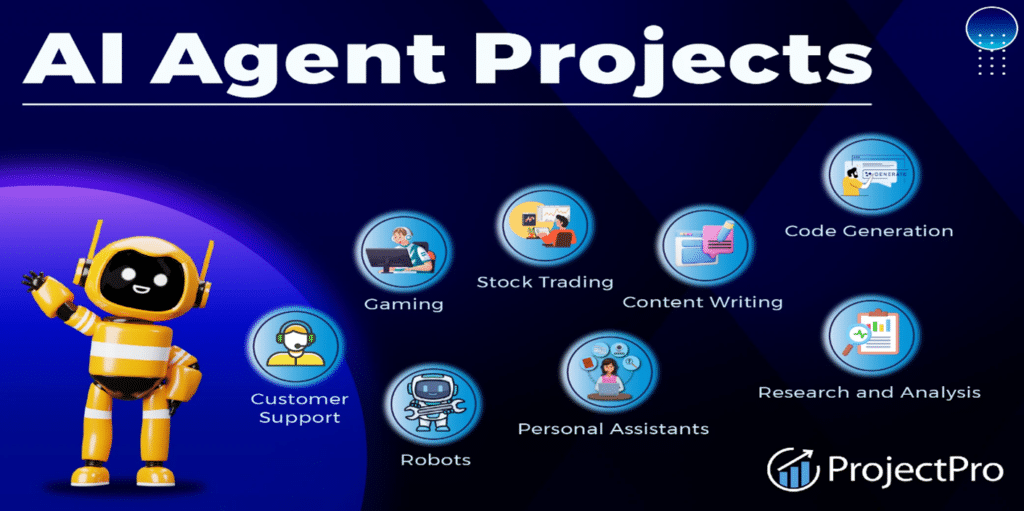Table of Contents
ToggleHow to Use AI Agents for Your Digital Marketing

the ever-evolving landscape of digital marketing, staying ahead of the curve is not just a competitive edge—it’s a necessity. As businesses seek smarter, faster, and more efficient ways to connect with their audience, AI agents are transforming how strategies are designed and executed. Whether you’re a startup looking for an AI marketing agent to automate campaigns or a growing brand searching for a digital marketing agency near me that leverages smart automation tools, understanding the role of AI agents for your digital marketing is critical in 2025.
So, what exactly are AI agents, and how can they elevate your campaigns to the next level?
In simple terms, AI agents are intelligent digital assistants designed to perform tasks traditionally managed by humans—only faster, more accurately, and at scale. These tools can analyze massive data sets, personalize content in real time, automate customer engagement, and even create content tailored to your brand tone. Platforms like Skott AI have revolutionized this space, offering AI agents for marketing agencies and businesses to streamline operations, improve ROI, and save countless hours.
Whether you’re running a digital ad agency or exploring new tech as an AI agency, learning how to integrate tools like a personal AI agent, AI coding agent, or even a Skott AI agent into your workflow can set you apart in a noisy digital space. From predictive analytics to AI-powered ad creation, these innovations are not just trends—they’re the future of marketing.
In this blog, we’ll dive deep into:
- What AI agents are and how they function
- Real-world examples of AI agents for digital marketing
- How AI marketing agencies are using tools like Skott AI
- Benefits of AI automation for digital ad agencies
- How to choose the best AI agents platform for your brand
- Case studies and success stories
- Tips for integrating AI agents in your campaigns without losing the human touch
How to Use AI Agents for Your Digital Marketing

In today’s fast-paced digital world, marketers are constantly seeking smarter, faster, and more cost-effective ways to connect with their audiences. That’s where AI agents come into play. These intelligent tools are transforming the landscape of digital marketing by automating routine tasks, delivering personalized user experiences, and unlocking powerful insights from data—all in real time.
Whether you’re running a small business or managing a large-scale marketing operation, leveraging AI agents can help you stay competitive, boost ROI, and scale your efforts with precision. From chatbots and content creators to predictive analytics and ad optimization tools, AI agents are no longer a futuristic concept—they’re a practical necessity.
In this blog, we’ll explore how to effectively use AI agents across different areas of digital marketing, the tools leading the charge, and best practices to maximize results. Ready to let AI do the heavy lifting while you focus on strategy and creativity? Let’s dive in.
1. What Are AI Agents?
AI agents are intelligent software systems programmed to perform complex tasks autonomously. Unlike traditional automation, which relies on fixed rules, AI agents use machine learning and natural language processing to understand, adapt, and make decisions based on real-time data.
These agents can:
- Create and schedule posts
- Analyze customer behavior
- Personalize email campaigns
- Optimize ad spends
- Recommend content
- Generate reports and insights
For example, a digital ad agency might use an AI marketing agent to A/B test ad creatives, while a small business searching for a “digital marketing agency near me” may get automated SEO reports through a dashboard managed by AI.

02. How AI Agents Work in Digital Marketing
AI agents aren’t just software—they’re intelligent digital assistants trained to think, learn, and act on your behalf. In digital marketing, these agents use advanced algorithms, machine learning, and natural language processing to analyze data, predict outcomes, and automate tasks that once required hours of manual effort.
Think of them as tireless team members who can handle everything from understanding customer behavior to generating personalized content and managing ad campaigns. They continuously learn from user interactions, adapt strategies in real-time, and make decisions based on data—not guesswork.
By integrating AI agents into your marketing stack, you gain access to smarter automation, deeper insights, and scalable solutions that help you reach the right audience at the right time with the right message.
In this section, we’ll break down exactly how these AI agents function behind the scenes—and how they’re revolutionizing the digital marketing game from the ground up.
AI agents operate across different marketing channels—social media, SEO, PPC, and email. Here’s how they work:
- Data Gathering: Pull data from Google Analytics, CRMs, ad platforms, etc.
- Pattern Recognition: Detect trends, audience behavior, and potential opportunities.
- Decision-Making: Suggest or implement changes in real time.
- Execution: Create and post content, run ads, or reply to customer queries.
An AI agency or AI agents platform will typically provide dashboards where marketers can train or guide the agent based on specific business goals.
03.Examples of AI Agents in Action
The best way to understand the real power of AI agents in digital marketing is to see them in action. From automating everyday tasks to making complex data-driven decisions, AI agents are quietly running the show behind some of the most successful marketing campaigns today.
These aren’t hypothetical scenarios—they’re real-world examples where businesses are using AI to boost efficiency, enhance customer experience, and drive measurable growth. Whether it’s a chatbot responding to customer queries in real time, or an AI engine personalizing product recommendations, these agents are delivering results that were once impossible with manual processes.
In this section, we’ll explore practical, real-life use cases across different areas of digital marketing—including content creation, ad targeting, email marketing, customer support, and more. These examples will show you just how versatile, scalable, and impactful AI agents can be when integrated strategically.
Here are a few real-world AI agents for digital marketing examples:
- Skott AI Agent: Skott AI uses smart assistants to automate campaign creation, data tracking, and content suggestions, making it an excellent tool for AI marketing agencies.
- Personal AI Agents: Some marketers use personal AI agents to manage daily tasks—like summarizing performance reports or drafting blog ideas.
AI Coding Agents: These help automate code-based marketing tasks like email personalization scripts or tracking setup—ideal for more tech-savvy digital marketing agencies.
04.Benefits of Using AI Agents for Your Marketing Strategy

Here’s why every digital ad agency and AI marketing agency is turning to AI agents:
Improved Efficiency
AI agents reduce the time spent on repetitive tasks like ad monitoring or content scheduling.
Data-Driven Accuracy
They offer insights that a human might overlook, ensuring smarter decisions.
Personalized Customer Experience
Deliver hyper-personalized messaging to each customer based on their journey.
Cost Reduction
Automating tasks with an AI agent for digital marketing saves money on human resources.
24/7 Operation
While your team sleeps, AI keeps optimizing, monitoring, and responding
05.Skott AI: A Game-Changer in AI-Powered Marketing
Skott AI is rapidly becoming the go-to tool for AI agents in marketing agencies. Here’s what makes it powerful:
- Smart campaign recommendations
- In-depth competitor analysis
- Voice & tone-matched content generation
- Seamless integration with Meta, Google Ads, and CRM tools
If you’re a digital marketing agency near me (or any local business), Skott AI can turn your campaigns into automated growth machines
06.How to Choose the Right AI Marketing Agent or Platform.
With hundreds of AI-powered marketing tools flooding the market, choosing the right one can feel overwhelming. Each platform promises automation, insights, and better results—but not all of them will suit your specific business goals or marketing workflow.
Selecting the ideal AI marketing agent isn’t just about features; it’s about finding a solution that aligns with your budget, team size, technical skills, and long-term strategy. Whether you’re a solo entrepreneur looking to streamline tasks or a marketing team aiming to scale, the right tool can make a massive difference in your efficiency and ROI.
In this section, we’ll guide you through the key factors to consider before making a choice—from identifying your marketing pain points to evaluating ease of use, integrations, and support. Plus, we’ll highlight some top-rated platforms to help you get started.
There are tons of AI agents platforms, but here’s how to pick the best:
- Identify your goals: Do you need help with content, ads, or analytics?
- Ease of Use: Can your team manage the platform with minimal training?
- Customizability: Can you teach the agent your brand tone and messaging?
- Integration: Does it connect with your CRM, email, and ad tools?
Some trusted tools other than Skott AI include Jasper, Copy.ai, and HubSpot’s AI suite
07.How AI Agencies Use AI Agents to Drive Results
AI marketing agencies and advanced digital ad agencies integrate AI agents in every stage of the funnel:
- Lead Generation: Use predictive data to target high-intent leads.
- Ad Optimization: AI agents adjust budgets and creatives based on performance.
- SEO: Auto-suggest keywords, content clusters, and backlink opportunities.
- Customer Service: AI chatbots powered by these agents can reply in natural language, increasing engagement.
A well-trained AI marketing agent not only assists—it becomes a part of your core marketing team.
08.Future Trends: Personal AI Agents & AI Coding Agents

In the near future, marketers may rely more on:
- Personal AI Agents: Individual team members having their own AI assistant for task management, reminders, and automation.
- AI Coding Agents: Writing scripts for campaign automation, API connections, and customized dashboards.
- Voice-Controlled AI Agents: Imagine launching an ad by just speaking to your AI agent. Tools like Skott AI are already leaning in this direction.
Final Thoughts
The future of marketing lies in intelligent automation. Whether you run a boutique AI agency, a local digital marketing agency near me, or a fast-growing digital ad agency, adopting AI agents is no longer optional—it’s essential.
Platforms like Skott AI are making AI adoption easier and more accessible than ever. With the right tools and strategy, even small teams can create enterprise-level impact using AI agents for digital marketing.
It’s time to explore how your brand can benefit from this revolution. Start by identifying areas where AI can support your marketing—and take the first step into the future.
AI agents in digital marketing are software tools powered by artificial intelligence (AI) that automate and enhance various aspects of digital marketing. These AI systems can perform tasks such as customer segmentation, personalized content creation, data analysis, predictive analytics, chatbots, and social media automation. Their main goal is to increase efficiency, provide personalized experiences for customers, and improve decision-making through data-driven insights.
AI agents improve customer engagement by analyzing user behavior and preferences to deliver personalized experiences. They can automatically segment audiences and create targeted content based on individual interests. AI-powered chatbots and virtual assistants also enhance engagement by offering real-time support, answering questions, and providing product recommendations. Additionally, AI helps brands deliver the right message at the right time, increasing the likelihood of conversions and customer loyalty.
AI agents in social media marketing provide several benefits, including:
Content Optimization: AI can analyze social media trends, optimize posting schedules, and suggest content topics based on audience interests.
Sentiment Analysis: AI helps in monitoring customer sentiment and feedback, allowing businesses to respond to comments, reviews, and complaints proactively.
Ad Targeting: AI improves paid social media ad targeting by analyzing user data and preferences, ensuring that ads reach the most relevant audiences.
Automation: AI can automate routine tasks like scheduling posts, analyzing performance metrics, and reporting, saving marketers time and effort.
Yes, AI agents can be cost-effective in the long term. While the initial investment in AI technology might seem high, AI agents help reduce operational costs by automating repetitive tasks, improving campaign performance, and allowing marketers to make data-driven decisions. They can also lead to higher conversion rates, improved customer retention, and better use of marketing resources, ultimately delivering a strong return on investment (ROI).

